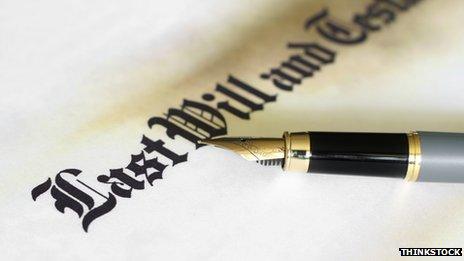How to be clear in your will
- Published

The recent furore over the £520,000 legacy left in the will of the late Joan Edwards to the government, highlights the need for a will to be drafted clearly so it accurately reflects the intentions of the individual.
Joan Edwards passed away in September 2012, aged 90, and left her estate to "whichever government is in office at the date of my death for the government in their absolute discretion to use as they may think fit".
This wording however caused some confusion.
The executors of the will interpreted this to be a donation to the political party in power, and both the Conservatives and Liberal Democrats accepted the donation.
The public outcry that followed caused both parties quickly to hand back the money so that it could go to the Treasury.
Miss Edwards had been a nurse, so it was argued by many, that her intention must have been for it to go to the NHS.

Susan Midha warns that wills need to be totally unambiguous
It may never be clear what her true intention was - but what is clear is that the wording used in the will was ambiguous.
'Armchair principle'
The second case that has hit the headlines involves an anonymous £500,000 legacy made also to the government in 1928, which came with the strict stipulation that it "could only be used to reduce the national debt to zero".
Eighty-five years later and the fund is estimated to be worth £350m, but because the national debt stands at about £1.2 trillion, it cannot be touched.
It would in this instance have been helpful for the will to have contained a clause that covered this scenario, or if the wording was a little more clear.
When the courts have to rule in cases interpreting a will, there is the "armchair principle" in England and Wales.
The court will endeavour to discover the intention of the deceased (the "testator") and by looking at extra evidence submitted.
It would therefore place itself in the "armchair" of the testator and consider the circumstances that surrounded them when they made their will, to assist arriving at their intention.
The law in Scotland and Northern Ireland may differ and separate legal advice should be sought.
Nicknames
Homemade wills need to be very carefully drafted.
It can be a false economy to make a homemade will, if your beneficiaries then face a costly legal battle to prove your intentions in court.
Strict rules governing the way a will is made and executed mean that errors can be made very easily which can invalidate it.
These errors often include not signing the will or having it witnessed correctly.
The wording of a will can also be problematic as words and terms have specific meanings in law, which may be different to their use by the testator in their will.
There are regularly problems with the naming and the identification of individuals in wills.
Referring to people by nickname, or an abbreviated name, may cause confusion.
Also be careful if you have family members of the same name.
If you are related to two John Smiths but only want one to be a beneficiary, then make sure you specify which one is the true beneficiary.
Public record
Don't forget to include substitute beneficiaries if someone you name as a beneficiary dies before you - and don't assume that the children of a deceased beneficiary will (or will not) take their parents' share - there are special rules which can apply.
Altering your will by crossing out sections or making amendments after it has been signed will usually mean the alterations will be invalid and can lead to conflict within the family which can end up in the courts.
And it is worth remembering that your will when proved after your death becomes a matter of public record - which means that any one can look at it and obtain a copy.
So references to, for example, "that waste of space who is my son" may be worth avoiding.
If your will is judged to be invalid then your estate would be distributed in accordance with an earlier valid will or by the intestacy laws.
Your intention may not be for the government to benefit, but if there are no family members to inherit and no will, your estate will usually pass to the Crown, ultimately funding the Queen's activities as head of state.
The opinions expressed are those of the author and are not held by the BBC unless specifically stated. The material is for general information only and does not constitute investment, tax, legal or other form of advice. You should not rely on this information to make (or refrain from making) any decisions. Links to external sites are for information only and do not constitute endorsement. Always obtain independent professional advice for your own particular situation.
- Published23 April 2012
- Published19 October 2011